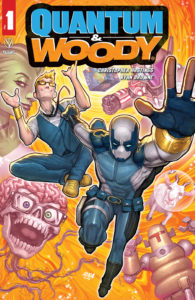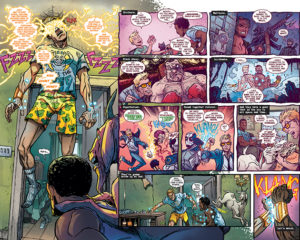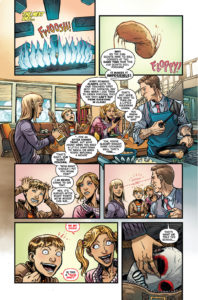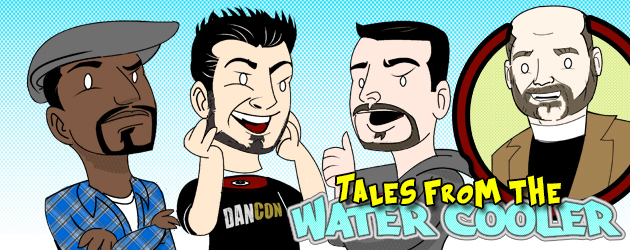Quantum & Woody #1
Publisher: Valiant Comics
Story: Christopher Hastings
Artist: Ryan Browne
Colorist: Ruth Redmond
Letters: Hassan Otsmane-Elhaou
Cover: David Nakayama
I’ve been looking forward to getting my hands on Quantum & Woody for some time now. I’ve always heard great things about the series. Having not been acquainted with the characters prior to this review, I’m pleased to say that writer Christopher Hastings manages a pretty competent recap of the duo’s origins. It goes without saying, however, that those flashbacks are handled briskly, as to not bog down this new arc by backtracking. The issue begins by lampooning our fixation with social media before segueing into some sharp commentary on managing one’s brand in today’s media-rich ecosystem. While the humor is quite timely, I cannot help but note that a lot of the comedic interplay between Chris and Woody rings hollow for me. Long time fans may find the tone is one maintained through previous interpretations of the characters but as a first-time reader, it comes off as forced and disingenuous. If you’ve enjoyed the previous stories, you will likely appreciate the over the top action and humor, while artist Ryan Browne’s nostalgic take on the characters is strongly reminiscent of 90s era comics.
As the issue unfolds, we’re presented with an ethical aberration from what we would consider appropriate behavior for our heroes. And though Quantum objects to it on principle, in his objection we witness two incontrovertible truths. The first, the act is well within his expectations for his adopted brother. The second, in spite of this propensity for deception, Quantum will go along with the ruse knowing Woody is lying. Knowing that the lie may have caused the deaths of innocent people and may yet cause more. This is where I admit that I simply may not be the target audience for this book. If acceptance of this narrative is predicated on existing knowledge of these characters, then I’m lacking essential reference. I’m sure that fans can point to any number of occurrences in past stories that justify both Quantum and the audience giving Woody the benefit of the doubt, but as a new reader, I have no basis to extend consideration that here. It’s strange to want to be pulled in but to feel the narrative beats break the immersion. By the end, I was asking, “Do I want to know where this is going? What is endearing about these characters?”
Hastings manages to infuse more organic repartee into his family of villains than the book’s namesakes, and as a result allusion to Woody’s constant scheming makes a more cohesive case against him. These aspersions are played for quick, ambivalent laughs, but I ultimately feel like the development of both Quantum and Woody suffer for those chuckles. I don’t think characters are inherently funny. Circumstances can be funny, especially when they’re used to give characters room to establish themselves. To me, the psychology that informs their behaviors and mannerisms is the difference between a funny character and a sad one. Is the dialogue or action, and I mean on the part of the character’s voice, a defense mechanism, a calculated gambit, or an involuntary expression. When the interactions are organic, these questions are answered without ever being asked. It’s the difference between a one-note caricature and a relatable person. With Quantum & Woody, I see the caricature, Woody being the sly, enigmatic Force Majeure and Quantum playing the sensible, reserved straight man. But these roles are dealt out immediately by an author who, obviously knowing more than we do, hasn’t quite let us in on the magic. At least not yet.
Christian Davenport
cable201@comicattack.net







Pingback: Around the Tubes | Graphic Policy
Pingback: Around the Tubes | The Spinner Rack